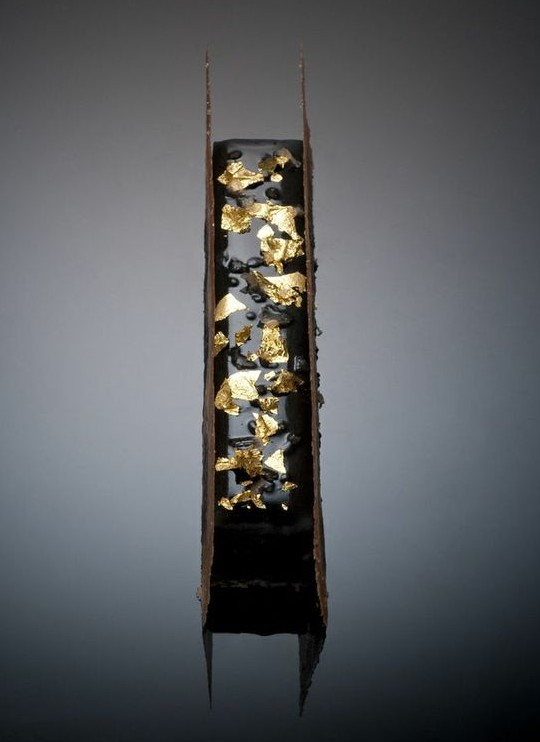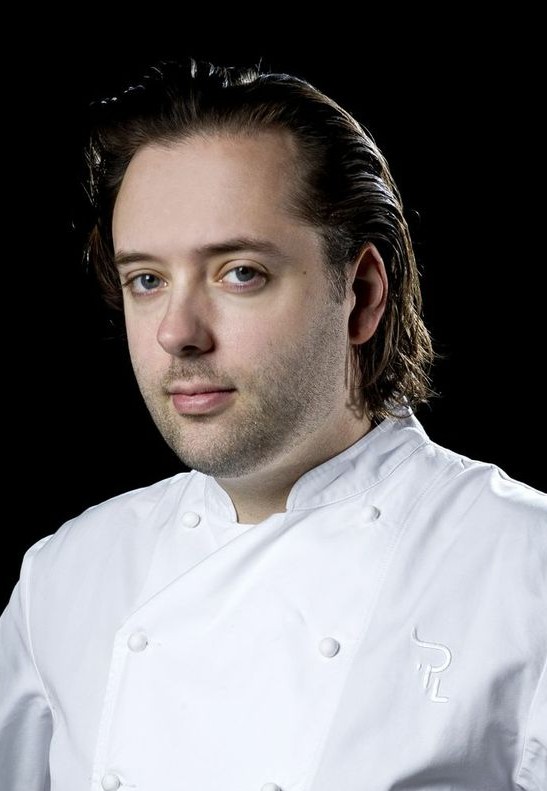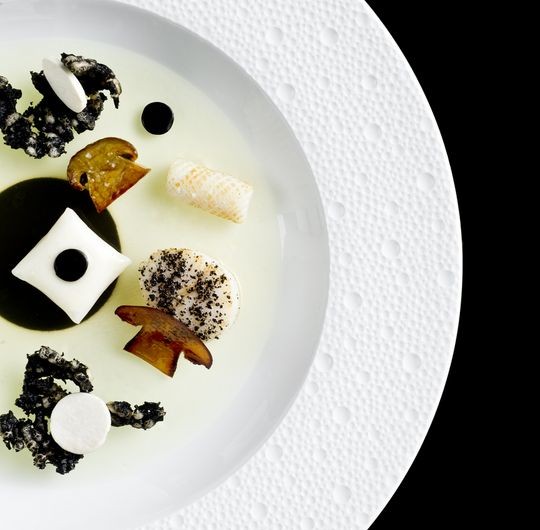We had the honor of sitting down with Chef Paul Liebrandt recently to talk about his culinary background, philosophy and his new restaurant project The Elm.
How did u get into cooking initially?
I suppose I stumbled into cooking. It wasn’t like a lot of chefs they have a lineage of a family or….mine didn’t have anything to do with food. I don’t know really. It wasn’t one thing that I was going to go and cook. I just liked food, ingredients. Not one particular thing, definitely not.
Who were your mentors early on?
When I was a younger man, Marco Pierre White, Pierre Gagnaire, Raymond Blanc, people who I had worked for were a huge influence on me in various ways. In some ways for their rigor, their mentality, their focus of how to be a chef from a chef’s point of view. Some for the creative aspect, for purely culinary, purely just the food. And their approach and the way they think about food.
How would you describe your culinary style?
I would describe my culinary style at present to be modern European, contemporary French if you’d like a little more specificity there. I wouldn’t say that it’s too boxed in with being French. There is a lot of influence there from Japanese ingredients and technique to Southeast Asia, as I think there are probably in most modern chefs these days. There are a lot of world influences because the world is obviously a much different place than it was quite a while ago.
What were the steps that led you to where you are now, from Atlas to Gilt to Corton?
Gilt was seven years ago and I was seven years younger. I think any chef when they’re young, every five years is the future. In terms of technology, in terms of in general, most people, that’s the way they look at the future. So, that was the future.
My cooking now is more of an amalgamation of what I was doing at Atlas and French. At Atlas, we were some of the first people to do molecular gastronomy in this country, before Alinea, before any of that. It was more El Bulli-esque kinds of things mixed with that Gagnaire-esque French technique. And, it was very great food. I’ve evolved since then, because I’ve seen the way the food world as a whole around the globe is moving and I like to reinvent my cuisine to a point and keep it fresh and motivated. Some things don’t change, the standards, the rigor, the way that we think about food. The combinations, that doesn’t change; however, because we are seven years on, the techniques and the focus is different.
What inspired you to start work on The Elm, which is a more casual concept than Corton?
I am doing this project because I was approached by my partners there and it was a very good opportunity to have a presence in an area of New York City that is only expanding and is growing in every possible way. And, I think that is a very good way to look at restaurants. I am going to be doing something there that is more affordable than Corton. There will be no white tablecloths, there will be music in the dining room and the dining room has a completely different feel of dining experience. The same PL style on the food; it’s devoid of all the bells and whistles that you have in fine dining, canapés, amuse bouche etc. It will be French style with my interpretation of classical French food with classical French flavors and technique done in a subtle way. I’m not trying to reinvent the wheel, I’m not trying to do a French brasserie, but we have a good grasp on what we want to do there, which I looked at the market and there is not anything out there like that.
Is it the same foundation?
I mean it’s always the same foundation. We cook a piece of fish and we cook a piece of fish. At Corton, we may be using turbot or shima aji. At the Elm, we may be using skate. But, we still approach it in the same manner. It doesn’t change. When you’re talking about casual food, you’re talking about accessibility. You’re not talking about how accessible on the plate it is. Price is what makes it exclusive or not. If Per Se was $50 per head, it would be thought of very differently because it would be much less exclusive. So, it really does come down to the price of the dining experience. So, obviously the Elm is priced in a more sensitive manner to a bigger, wider audience. So, that makes it more ‘casual’. Although, that’s a difficult word to use because I’m doing a restaurant not a bistro or brasserie. I would prefer to call it affordable luxury. Very good ingredients, cooked very nicely in a really great feel dining room, with a great atmosphere at a price point that most people can afford and can come back every week. And, I feel that is where the future of dining is going. Corton is obviously the 0.1% in this country. In Asia, fine dining is very much there still.
What qualities do you look for in the people you hire?
It’s not necessarily how much experience they have. If a young person comes to me, I’m looking at their will. I’m looking at their drive. If they have an open mind and when they’re shown something if they listen and pay attention and they have that focus. And they have the will to succeed. I give them the tools necessary to succeed but they have to have the will to want to do it. And that is really what I’m looking for when I have a young person come here. And then once I’ve given them those tools, it’s a question of monitoring every day. It’s up to them to make sure and if they decide it’s not for them, then it’s not for them. But, generally it’s the person; we spend so many hours together that I want to enjoy the person’s company that I’m working with. And, do they fit well within a team? Are they a team player rather than an individual? It’s just basic rules of working together.
How about culinary school? Do you recommend it?
No, not necessarily because everybody is different. I didn’t go to the CIA, I didn’t do all that, but that’s me. It doesn’t mean that it was right or wrong. It’s the same as anybody in any career. There’s the way we all think life should go and then there’s the way it does go. It doesn’t mean that it’s wrong, it’s subjective.
At the moment, are there any ingredients or techniques that are particularly exciting to you?
Because it’s spring, garlic is all over the place right now. We’re doing fresh garlic in all kinds of ways, which is a lot of fun. Not the same as most wild ingredients, but it’s got a lot of character to it. Technique-wise, I’m not one of those chefs who says ‘I’ve invented this new technique’. I’m not like that. I just do what I do; I’ve never been showy about the food. A lot of the European chefs, they are like that, but that’s not me. I think of myself as not just playing with the food, but I’m orchestrating the show every night. I want to move more now to being more of a restaurateur than just a straight chef.
What’s your favorite kitchen tool?
Realistically, it’s my hands, my palette, my eyes, my senses. If I’m honest, because that’s the biggest tool. Without that, it’s all done. If we’re talking about an actual piece of equipment, a good spoon is always good to have. A good quality Japanese knife, absolutely. I wouldn’t go anywhere without it.
What are your favorite places to eat?
En Brasserie. It’s simple, it’s clean, it’s an everyday kind of place. Bar Masa is great; it’s fun and delicious. If I go for sushi, I’m not going at 7, I’m going at 11. So, Blue Ribbon sushi is open then, and it’s really consistent and really, really good. But for me, that is sort of it. If I could eat just Japanese food everyday I would.
You recently spent a week in Japan. How would you compare the food there to what people encounter here in the U.S. or in Europe?
It’s amazing. It’s night and day, it’s oil and water, it’s light and dark. The reverence for the product, the reverence for the technique of just cooking, is far beyond anything in this country. The discipline and the bushido and the craftsmanship, your focus of doing something because that’s what you were born to do, you don’t see that in the U.S. And, I’m not that old but I’m old enough to have touched on a time when that classical French generation was very similar to that. But it’s changed now. Everyone’s got ADD. No one can focus on anything for too long, because they want everything instantly and they don’t want to work for it. It’s a simple thing. The cooks will cook in a particular part of the kitchen for a couple months and then expect to move. To become really masterful and do something until it becomes muscle memory, to do that you have to have patience and understand the longer picture. So, for me, I think it’s very important that remains and I see that in Japan. And, it’s something which is lost here. It’s my home here (U.S.) and I shouldn’t say that, but it’s the truth. And the truth is very simple. It’s worldwide. Its’ not what it was. In Japan, I love that mentality and that approach. It’s ‘Welcome to my home’ and it’s reverence for every single little thing and I love it. I think that is the way life should be. Life would be better if everything was like that and people were dedicated and people were focused.
Do you have any advice for young cooks starting out?
This is not a 100 meters, this is a marathon this business. It’s very hard to tell young people that. They want to jump on it and they want to run and that’s important. It’s good to have that. But you need to obviously be balanced and understand it doesn’t happen all in one day. You do have to be patient. You have to work at it and you have to keep up that ambition. You have to keep up that focus and that drive. When I say to them, I can tell you something, I can show you the door but you have to walk through that door.
Photo credit: Evan Sung



